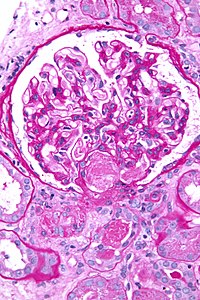
Venoarterial Extracorporeal Life Support Utilization in a Pediatric Trauma Patient Following a Severe Dog Mauling.
Sign Up to like & getrecommendations! Published in 2019 at "Pediatric Emergency Care"
DOI: 10.1097/pec.0000000000001753
Abstract: According to the Centers for Disease Control and Prevention, approximately 4.5 million dog bites occur each year in the United States, and more than half of these cases affect children. An estimated 1 in 6… read more here.
Keywords: dog; pediatric trauma; severe dog; following severe ... See more keywords

Evaluation of medication changes following severe COVID-19 infection: a multicentre evaluation
Sign Up to like & getrecommendations! Published in 2021 at "BMJ Open Respiratory Research"
DOI: 10.1136/bmjresp-2021-001037
Abstract: Background Critically ill patients often experience several transitions of care following critical illness. Research has explored the challenges which patients have with medication management across these transitions. It is unclear whether patients admitted to critical… read more here.
Keywords: evaluation; medicine; following severe; medication ... See more keywords

Change in biomarkers of type-2 inflammation following severe exacerbations of asthma
Sign Up to like & getrecommendations! Published in 2018 at "Thorax"
DOI: 10.1136/thoraxjnl-2018-211657
Abstract: We investigated the time course of change of type-2 asthma biomarkers after a severe asthma exacerbation. Blood eosinophils were lowest immediately after treatment was initiated (0.07 vs 0.33×109/L, p read more here.
Keywords: following severe; biomarkers type; change; type inflammation ... See more keywords

Acute Brain-Derived Neurotrophic Factor DNA Methylation Trajectories in Cerebrospinal Fluid and Associations With Outcomes Following Severe Traumatic Brain Injury in Adults
Sign Up to like & getrecommendations! Published in 2021 at "Neurorehabilitation and Neural Repair"
DOI: 10.1177/15459683211028245
Abstract: Background. Epigenetic biomarkers have the potential to explain outcome heterogeneity following traumatic brain injury (TBI) but are largely unexplored. Objective. This exploratory pilot study characterized brain-derived neurotrophic factor (BDNF) DNA methylation trajectories following severe TBI.… read more here.
Keywords: following severe; methylation; dna methylation; brain derived ... See more keywords

Therapeutic hypothermia in patients with coagulopathy following severe traumatic brain injury
Sign Up to like & getrecommendations! Published in 2017 at "Scandinavian Journal of Trauma, Resuscitation and Emergency Medicine"
DOI: 10.1186/s13049-017-0465-y
Abstract: BackgroundCoagulopathy in traumatic brain injury (TBI) has been associated with poor neurological outcomes and higher in-hospital mortality. In general principle of trauma management, hypothermia should be prevented as it directly worsens coagulopathy. Therefore, we examined… read more here.
Keywords: following severe; patients coagulopathy; coagulopathy following; hypothermia ... See more keywords

Glibenclamide does not improve outcome following severe collagenase-induced intracerebral hemorrhage in rats
Sign Up to like & getrecommendations! Published in 2021 at "PLoS ONE"
DOI: 10.1371/journal.pone.0252584
Abstract: Intracerebral hemorrhage (ICH) is a devastating insult with few effective treatments. Edema and raised intracranial pressure contribute to poor outcome after ICH. Glibenclamide blocks the sulfonylurea 1 transient receptor potential melastatin 4 (Sur1-Trpm4) channel implicated… read more here.
Keywords: following severe; glibenclamide; improve outcome; outcome ... See more keywords